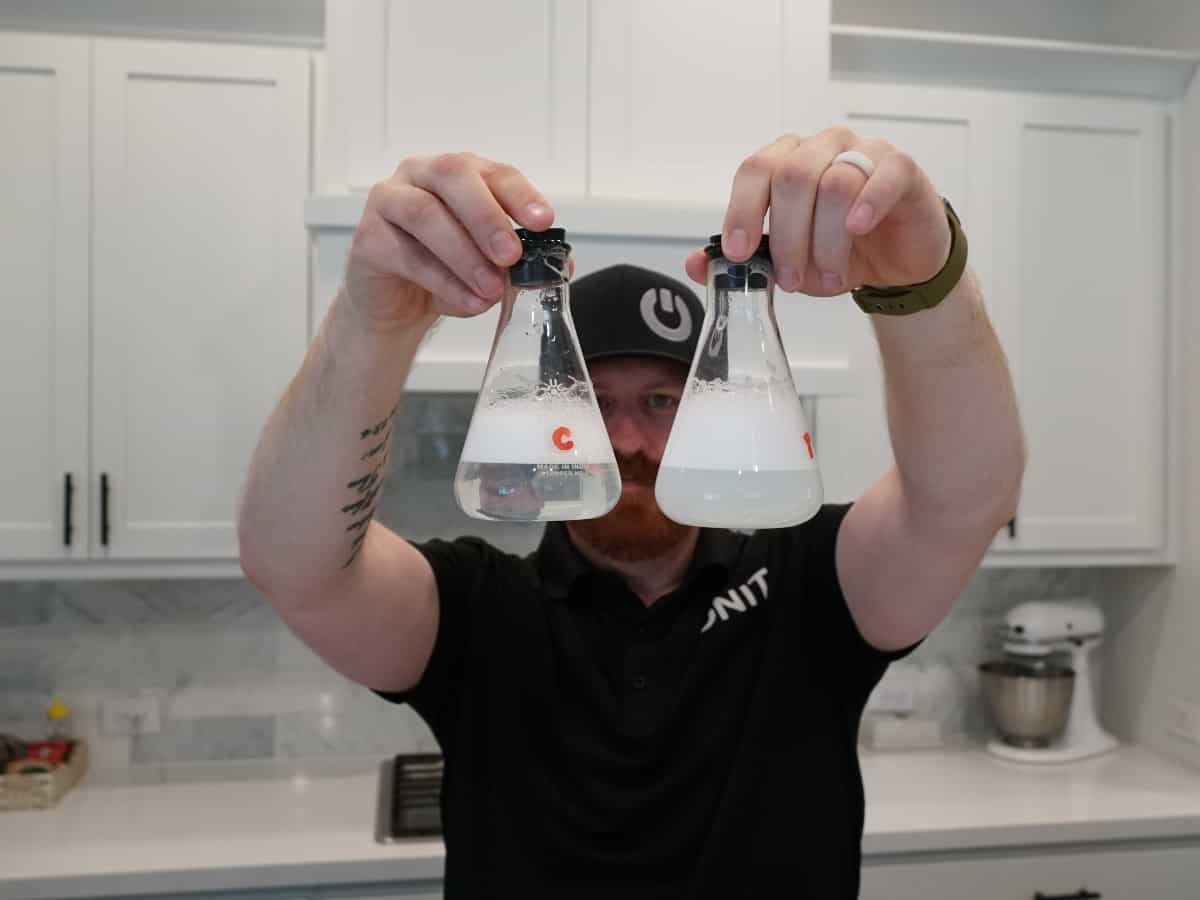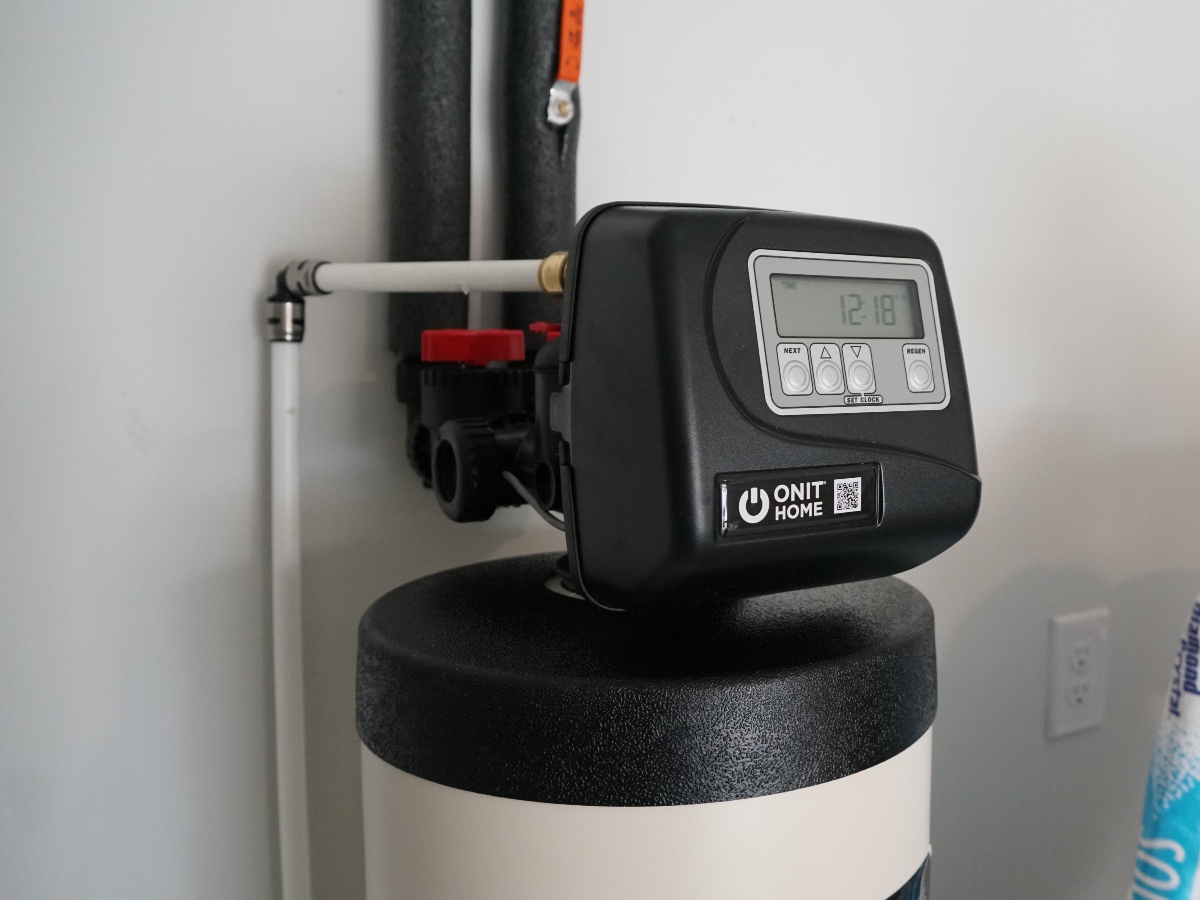Hearing your water tastes like metal? It can be cause for alarm, as some causes may indicate containments that can lead to health issues, though others may be harmless. Learning about the causes, containments, and treatments for metallic water taste can help you address the issue appropriately.
What Causes Metallic Water Taste?
There are a few different explanations for why your water tastes like metal.
- Old Plumbing Systems: Older plumbing systems, both those in your home and the municipal water systems, used brass, galvanized steel, copper, and even lead pipes. Over time, those pipes deteriorate and leach minerals and metals into your water supply, some of which can be detected in the taste, appearance, and smell of your water.
- pH: Higher levels of pH often result in a metallic taste in your water. Low pH, or acidic, water can lead to tooth erosion and is likely to contain other contaminants.
- Water Softening Treatment: Often, treatments for hard water involve salt which can leave behind a metallic taste.
- Municipal Water Treatment: Similarly, some municipal water treatments can leave behind a faintly detectable metallic taste in the water. If municipal water treatment is the culprit, you’ll most likely notice it on an intermittent basis, rather than persistently.
Determining the Cause of Metal Taste in Water
A few questions to ask yourself when determining where your metallic taste is coming from:
- How long has it had that taste?
- Is it consistent?
- Is it coming from every faucet?
- Is it getting worse?
- Is anyone experiencing ongoing or new health issues?
If the taste is intermittent, it may be coming from your municipality’s water treatment process. If the taste is coming only from one faucet, replace the faucet and see if it helps. It may be the faucet itself causing the bad taste. If it’s an ongoing problem, you may have a plumbing issue. If there are health issues in the house, particularly flu-like symptoms or cognitive impairment, prioritize testing and treatment.

What Metals Cause a Detectable Taste In Water?
A number of metals can end up in your water. Some are harmful, some benign, and some okay for your health but a nuisance to deal with. Some, like arsenic and lead, aren’t detectable by taste but are often present with metals that you can.
Arsenic
While arsenic does not leave behind a detectable taste, it is often found present in water that tastes like metal. Even at low levels, arsenic can harm health and lead to issues like diabetes.
Chromium
While not detectable by taste, chromium is both naturally occurring and a byproduct of industrial processes. Chromium is known to cause cancer, damage the liver, kidneys, nerves, and cause circulatory disorders. There is some debate about the safe level of chromium, with the EPA setting their enforceable target (100 parts per billion) higher than some scientists are comfortable with.
Copper
In high enough levels, copper can lead to long-term kidney and liver damage in infants and in adults and digestive issues. Copper is one of the most common metals to detect, as water tastes like metal even at low levels of contamination. In small amounts, copper is an essential nutrient for humans. The EPA recommends no more than 1.3 parts per million.
Iron
While not a health risk, high levels of iron in your water are a nuisance. It can stain clothes, skin, and appliances. Iron-rich water can look dirty, smell and taste metallic, and even change the color of food cooked in it. Clothes washed in iron heavy water can be stiff and look stained.
Lead
Often found in water contaminated with copper, lead is deeply harmful to health even at any level. It doesn’t have a taste, but it’s worth testing if your water tastes like metal. Lead poisoning can lead to headaches, fatigue, insomnia, flu-like symptoms, and lowered cognitive function. Children are at particular risk from lead contamination and can face life-long illnesses. Seek treatment immediately if you think your water might have lead.
Manganese
This metal occurs naturally and is a byproduct of a number of industrial products. In small quantities, it is an essential nutrient for the human body. However, in higher concentrations (50 parts per billion or below), it can damage the nervous system. At those levels, it’s detectable as a metallic taste and can leave a brownish-red stain or black slime behind.
Nickel
While nickel leaves behind no detectable smell, taste, or color when it is present in drinking water, it can cause some individuals to experience skin irritation. Anywhere from 10-20% of the population in the US is at risk of experiencing skin rashes or other irritation after contact with nickel-contaminated water. The EPA currently has no enforced limits on nickel, after a challenge by the Nickel Development Institute on the previous targets was successful in 1995.
Zinc
At higher levels, zinc can produce cramping, vomiting, and nausea. With consistent exposure, after two weeks, it can lead to seizures, coughing, urine retention, jaundice, fever, joint pain, and lowered blood pressure.

How To Test Water For Metal
If your household has water that tastes like metal, the first step should be to get a comprehensive water test done. Learn what your water contains so you can take the proper steps to treat it. ONIT Home offers a free water test and consultation so you can understand what’s in your water.
How Often Should You Test Your Water?
The EPA advises that you test your water annually if you are on a private water supply and if certain events occur.
- If you detect metal tastes in water
- If someone is pregnant in your household
- If there’s been a recent industrial or chemical spill nearby
- If there has been unexplained illness in your household
If you are on a municipal water supply, you can obtain a copy of their water quality report. They test annually. While municipal water supplies are treated, they may not be treating water to the level you’d prefer. They may have higher allowances for certain contaminants than you are comfortable with. Municipal water treatment may also be the source for water that tastes like metal. If you have any concerns about your water quality, test it.
How To Treat Metal Tastes in Water
You may be lucky enough to resolve metal tastes in water by simply replacing a faucet, but in most cases, that won’t be sufficient to resolve the issue. One way to ensure your water is fresh, clean, and healthy is to use a whole home filtration system. These systems tackle hard water, contaminants, debris, and other issues so your tap delivers fresh water on demand. No metallic tastes, foul odors, or potentially harmful intruders in your family’s water supply.
Why Whole Home Filtration Systems Are the Best Option for Metal Tastes in Water
Water that tastes like metal is only one concern about the quality of the water delivered from your home’s taps. There are many contaminants that can cause health issues that can pass undetected. Other issues, like hard water, can damage your appliances and render your household cleaning supplies less effective, causing you to use more and thus spend more. The best solution to all these issues is whole home water filtration.
Whole Home Filtration:
- Eliminates fears about the safety and quality of your tap water.
- No more complaints that your water tastes like metal.
- Eliminates costs associated with buying bottled water or replacing pitcher filters.
- Reduces costs associated with appliance maintenance as hard water and some contaminants damage your water-using appliances and plumbing systems.

How Do You Get Started With a Whole Home Water Filtration System?
The first step is to contact ONIT Home to schedule your free in-home water consultation. Our knowledgeable technician will come to your home at a time convenient for you. They will then do a series of rapid-result water tests and talk to you about the findings. Once you know where your water challenges lie, they will offer solutions that make sense for your household.
ONIT offers flexible financing to help you fit your whole home filtration system into your budget. Our skilled technicians will handle the installation process. All you need to do is turn on your tap to enjoy the benefits of clean water.
Ready to take the plunge into cleaner, healthier, tastier water? Visit us online or give us a call today at 1-833-433-0331 to get started. Our friendly staff is waiting to get your free water test and consultation scheduled. ONIT Home makes it easy to upgrade your water supply. We offer flexible financing, low maintenance systems, and a robust warranty to help you feel secure in our products and services.



